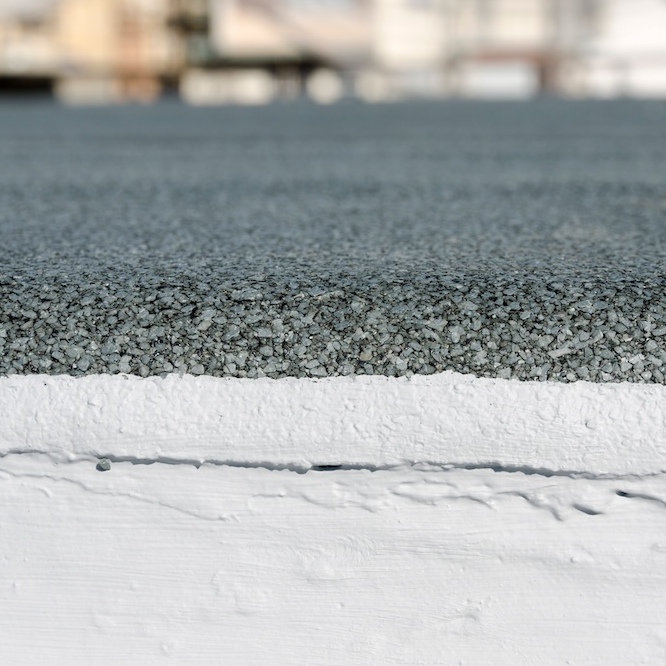
Are You Interested in a Modified Bitumen Roof?
With the wide range of weather in the Dallas, Texas area, a commercial structure needs the best roofing material possible. It has to be able to withstand hot blistering sunny days of Texas summers to ice and snow during the winter, with hailstorms in the spring that can do the most damage. It is because of this varying weather that more commercial structure owners are going with a modified bitumen roofing system.
What is a modified bitumen roof?
Many experts in the commercial roofing industry consider modified bitumen roofing as a built-up roofing system’s cousin. BUR (built-up roofing) has been the most common roofing material for over 100 years for flat or low-sloped structures. Today, modified bitumen roofing is taking its place.
Modified bitumen roofing is made by combining asphalt with polymerized rubber or plastic, then fiberglass is used to reinforce the product, creating a flexible, but rugged waterproof membrane. This roofing material can be installed in two layers or a multi-ply system.
How long does a modified bitumen roof last?
When installed correctly and maintained as recommended, a modified bitumen roofing system can last up to 20 years or more. This long lifespan is one reason for its popularity as well as the two different installation processes:
- Torch-down
- Peel-and-stick adhesive
What are the problems with modified bitumen roofing?
Most problems with a modified bitumen roof occur due to poor installation. It is important to interview several roofing contractors who specialize in modified bitumen roofing and check their references. The problems that occur include:
- Improper roof sloping leads to degrading material and water pooling
- Improper application of adhesives leads to seam separating
- Improperly installed insulation
- Moisture seeping into the material causes blistering
- Flashing installed incorrectly
- Punctured, torn membrane from wind-driven debris
You can avoid problems caused by poor installation by contracting a roofing company with extensive training and experience with modified bitumen roofing systems.
What is the most frequent cause of leaks with modified bitumen roofs?
Modified bitumen roof leaks can start leaking for several reasons some of which are:
- Improper flashing installation: This can be from not being properly fastened down in most cases.
- When modified bitumen roofing is installed by the torch-down method, the head can cause the moisture barrier to leak if not applied carefully.
- Modified bitumen roofs may experience leaks when a proper moisture barrier is not installed.
- Inadequate backwater laps and head laps can allow moisture to infiltrate the membrane, leading to blistering and leaks.
- Insufficient adhesive application.
- Poorly installed seams.
Can you walk on a modified bitumen roof?
Yes, when a modified bitumen roof is properly installed, it will hold up to foot traffic. For any area of the roof that supports building equipment or will be subjected to heavier foot traffic, additional reinforcement may be recommended.
How do you maintain a modified bitumen roof?
The different seasons and weather here in the Dallas, Texas area can abuse a modified bitumen roof, weakening its structural integrity. The key maintenance of this roofing material is consistent and thorough inspections. Those inspections should check the following:
- Exposed Insulation
- Clean and clear Drainage
- Broken Welds
- Holes, Rips, Tears
- Blistering
- Ponding water
Which is better TPO roofing or modified bitumen roofing?
When looking for new commercial roofing material, modified bitumen roofing has become a popular choice. Another choice is TPO roofing. But is one better than the other? Look at the benefits we have listed, and then along with your professional roofing contractor, you can choose the best for you:
TPO roofing benefits:
- Flexible in cold temperatures
- Available in a variety of colors
- UV resistant
- Energy Star-rated
- Cool Roof-rated
- Can be installed over existing roofing
- Lifespan up to 30 years
Modified Bitumen roofing benefits:
- Withstands wide temperature ranges
- Has a greater thickness
- Withstands foot traffic
- Reflective surface
- Lifespan up to 20 years.
Is there more than one type of modified bitumen?
Yes, there are two, both provide a high quality of protection and your commercial roofing contractor can help you choose which is best for your roofing application. The two types are:
- Styrene Butadiene Styrene (SBS):
A rubber-type of polymer that is installed with either a cold adhesive or hot asphalt mopped on.
- Atactic Polypropylene (APP):
A plastic-type of polymer that is installed either by heat-welding or torch-applied.
In Closing
Choose a commercial roofing contractor who has worked with all types of roofing systems, including a modified bitumen roofing system. Ask for referrals and check those references for satisfaction of the completed job. Getting two to three different quotes is always recommended and getting the quotes in writing as well as their warranty.
Before you make the commitment to a new modified bitumen roof or any type of roofing material on your commercial structure, check with your CPA on tax agreements. If you have need of a modified bitumen roof in Dallas, TX, get in touch with us today at 214-373-1500!
